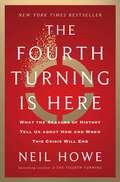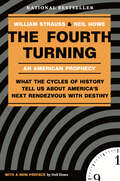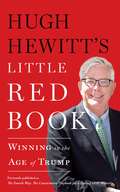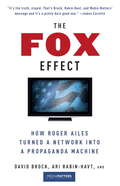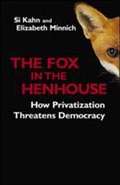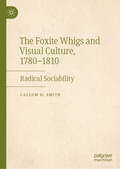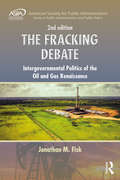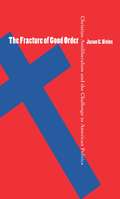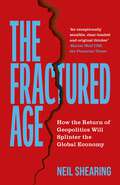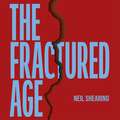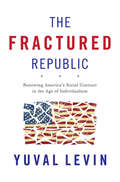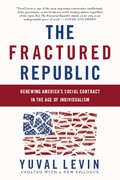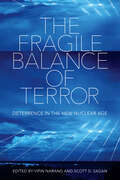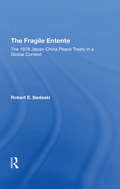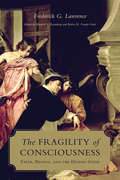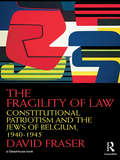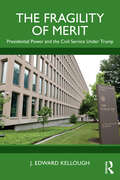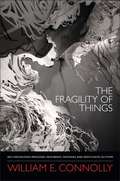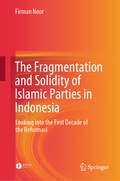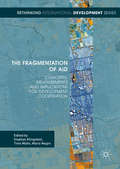- Table View
- List View
The Fourth Turning Is Here: What the Seasons of History Tell Us about How and When This Crisis Will End
by Neil HoweThe visionary behind the bestselling phenomenon The Fourth Turning looks once again to America&’s past to predict our future in this startling and hopeful prophecy for how our present era of civil unrest will resolve over the next ten years—and what our lives will look like once it has. Twenty-five years ago, Neil Howe and the late William Strauss dazzled the world with a provocative new theory of American history. Looking back at the last 500 years, they&’d uncovered a distinct pattern: modern history moves in cycles, each one lasting roughly eighty to one hundred years, the length of a long human life, with each cycle composed of four eras—or &“turnings&”—that always arrive in the same order and each last about twenty years. The last of these eras—the fourth turning—was always the most perilous, a period of civic upheaval and national mobilization as traumatic and transformative as the New Deal and World War II, the Civil War, or the American Revolution. Now, right on schedule, our own fourth turning has arrived. And so Neil Howe has returned with an extraordinary new prediction. What we see all around us—the polarization, the growing threat of civil conflict and global war—will culminate by the early 2030s in a climax that poses great danger and yet also holds great promise, perhaps even bringing on America&’s next golden age. Every generation alive today will play a vital role in determining how this crisis is resolved, for good or ill. Illuminating, sobering, yet ultimately empowering, The Fourth Turning Is Here takes you back into history and deep into the collective personality of each living generation to make sense of our current crisis, explore how all of us will be differently affected by the political, social, and economic challenges we&’ll face in the decade to come, and reveal how our country, our communities, and our families can best prepare to meet these challenges head-on.
The Fourth Turning: What the Cycles of History Tell Us About America's Next Rendezvous with Destiny
by William Strauss Neil HoweNATIONAL BESTSELLER • Discover the game-changing theory of the cycles of history and what past generations can teach us about living through times of upheaval—with deep insights into the roles that Boomers, Generation X, and Millennials have to play. First comes a High, a period of confident expansion. Next comes an Awakening, a time of spiritual exploration and rebellion. Then comes an Unraveling, in which individualism triumphs over crumbling institutions. Last comes a Crisis—the Fourth Turning—when society passes through a great and perilous gate in history.William Strauss and Neil Howe will change the way you see the world—and your place in it. With blazing originality, The Fourth Turning illuminates the past, explains the present, and reimagines the future. Most remarkably, it offers an utterly persuasive prophecy about how America&’s past will predict what comes next. Strauss and Howe base this vision on a provocative theory of American history. The authors look back five hundred years and uncover a distinct pattern: Modern history moves in cycles, each one lasting about the length of a long human life, each composed of four twenty-year eras—or &“turnings&”—that comprise history&’s seasonal rhythm of growth, maturation, entropy, and rebirth. Illustrating this cycle through a brilliant analysis of the post–World War II period, The Fourth Turning offers bold predictions about how all of us can prepare, individually and collectively, for this rendezvous with destiny.
The Fourth Way: The Conservative Playbook for a Lasting GOP Majority
by Hugh HewittFrom “the nearly professorial power-baron of conservative media” (Bloomberg), a handbook for how a united GOP government can solve problems and guarantee political success.Hugh Hewitt interviewed candidate Trump fifteen times on his nationally syndicated show during the 2016 campaign and participated as a panelist in four primary debates. What he learned from those news-making moments, along with his service for two Republican Presidents and his intimate knowledge of Washington, puts him in a perfect position to spell out how Trump and a unified GOP can transform the country and earn a lasting place in history. From defense to immigration, from entitlements to health care, Hewitt outlines how the new President, with the top leaders in Congress and with allies in fifty statehouses, can use November’s stunning result to find a Fourth Way out of the gridlock and the destructive showdowns that have marked the past quarter century of American politics.
The Fourth World: An Indian Reality
by Michael Posluns George ManuelA foundational work of radical anticolonialism, back in print Originally published in 1974, The Fourth World is a critical work of Indigenous political activism that has long been out of print. George Manuel, a leader in the North American Indian movement at that time, with coauthor journalist Michael Posluns, presents a rich historical document that traces the struggle for Indigenous survival as a nation, a culture, and a reality. The authors shed light on alternatives for coexistence that would take place in the Fourth World—an alternative to the new world, the old world, and the Third World. Manuel was the first to develop this concept of the &“fourth world&” to describe the place occupied by Indigenous nations within colonial nation-states. Accompanied by a new Introduction and Afterword, this book is as poignant and provocative today as it was when first published.
The Fox Effect: How Roger Ailes Turned a Network into a Propaganda Machine
by David Brock Ari Rabin-HavtBased on the meticulous research of the news watchdog organization Media Matters for America, David Brock and Ari Rabin-Havt show how Fox News, under its president Roger Ailes, changed from a right-leaning news network into a partisan advocate for the Republican Party. The Fox Effect follows the career of Ailes from his early work as a television producer and media consultant for Richard Nixon, Ronald Reagan, and George H.W. Bush. Consequently, when he was hired in 1996 as the president of Rupert Murdoch's flagship conservative cable news network, Ailes had little journalism experience, but brought to the job the mindset of a political operative. As Brock and Rabin-Havt demonstrate through numerous examples, Ailes used his extraordinary power and influence to spread a partisan political agenda that is at odds with long-established, widely held standards of fairness and objectivity in news reporting. Featuring transcripts of leaked audio and memos from Fox News reporters and executives, The Fox Effect is a damning indictment of how the network's news coverage and commentators have biased reporting, drummed up marginal stories, and even consciously manipulated established facts in their efforts to attack the Obama administration.
The Fox in the Henhouse: How Privatization Threatens Democracy
by Si Kahn Elizabeth MinnichPrivatization -- the auctioning of control over prisons, schools and resources to the lowest corporate bidder -- is one of the most important political and economic developments of our time. It affects virtually every person and state in the world. "The Fox in the Henhouse" not only sets the context for how privatization gained such a stronghold in today's society, but also offers alternatives to privatization that will strengthen society and the power of democracy.
The Foxite Whigs and Visual Culture, 1780-1810: Radical Sociability
by Callum D. SmithThis book offers a comprehensive exploration of the intricate relationship between radicalism and sociability in late Georgian parliamentary and extra-parliamentary politics, focusing on the Foxite-Whig faction. Re-evaluating the significance and tactical use of sociability and radicalism in late eighteenth and early nineteenth-century British politics, the book charts not only the rise and fall of a leading and neglected British political faction, but through its interdisciplinary and thematic focus, it seeks to intervene in the field and situate sociability as a key driver and facilitator of late Georgian politics. By utilising original research into contemporary newspapers, letters, diaries, legal records, parliamentary accounts, and especially political caricature, the author offers a new methodological approach in the study of sociability and radicalism and presents original categorisations of contemporary sociability. The book examines how sociability was strategically employed by the Foxite-Whigs and argues for the existence of two primary forms of sociability: insular and porous. Insular sociability manifested itself through dining, drinking to excess, or gambling in a private setting with members of the same aristocratic or political order. Porous sociability however was the extra-parliamentary mechanism by which Fox and his faction tactically opened their insular Whig World to forge connections with the lower orders, French revolutionary leaders, popular radicals, and Irish rebels. The author provides a detailed analysis of Foxite sociability within the context of distinct radical themes, including plebeian radicalism, French Revolutionary radicalism, and Irish radicalism. Beyond its innovative methodological approach to sociability studies, the book foregrounds visual culture as a lens through which to study and enter the &‘wordless experience&’ of the eighteenth century and to view the themes of sociability and radicalism from &‘within.&’ In doing so, the it reveals the inconsequential or informal dynamics of the Foxites&’ political and extra-parliamentary career from their origin in c.1780, to their decline in the early nineteenth century.
The Fracking Debate: Intergovernmental Politics of the Oil and Gas Renaissance, Second Edition (ASPA Series in Public Administration and Public Policy)
by Jonathan M. FiskThe disputes around fracking, and oil and gas policy, follow a long tradition of complicated intergovernmental relationships. Proponents argue that fracking supports new and well-paying jobs, revitalizes state and local economies, and that it can help replace reliance on other fossil fuels. Skeptics and opponents contend that oil and gas production via fracking contaminates air and water resources, causes earthquakes, and can ruin the character of many communities. Examining the intergovernmental politics of the first oil and natural gas boom of the 21st century, The Fracking Debate, Second edition offers a holistic understanding of the politics that characterize oil and natural gas operations, including why local governments are challenging their state’s preemptive authority, in order to initiate a larger conversation about improving intergovernmental relationships. Author Jonathan Fisk presents a novel argument about the ways in which local, state, regional, and national approaches to governance of shale gas development can work together to reduce conflict and forward the interests of the communities exposed to development, asking important questions such as: What state structures govern state-local relations? What state institutions impact and shape oil and gas production? What is the policymaking context in the state? What are the costs and benefits of hydraulic fracturing at the national, state, and local levels? How are risks and rewards distributed within states? What local policies have challenged the state, and why would local communities challenge the state? The result is a book that demonstrates that when stakeholders acknowledge their interdependencies and one another’s expertise, they create, design, and implement more responsive, strategic, and targeted public policies. The Fracking Debate, Second edition will be required reading for courses on oil and gas policy in the United States, environmental politics, and domestic energy politics, as well as a vital reference for practitioners and policymakers working in these fields.
The Fracture of Good Order
by Jason C. BivinsWhether picketing outside abortion clinics, speaking out at school board meetings, or attending anti-death penalty vigils, many Americans have publicly opposed local, state, or federal government policies on the basis of their religious convictions. In The Fracture of Good Order, Jason Bivins examines the growing phenomenon of Christian protest against civil authority and political order in the United States. He argues that since the 1960s, there has been a proliferation of religious activism against what protesters perceive as government's excessive power and lack of moral principle. Calling this phenomenon "Christian antiliberalism," Bivins finds at its center a belief that American politics is based on a liberal tradition that gives government too much social and economic influence and threatens the practice of a religious life. Focusing on the Catholic pacifism of Daniel and Philip Berrigan and the Jonah House resistance community, the Christian Right's homeschooling movement, and the evangelical Sojourners community, Bivins combines religious studies with political theory to explore the common ground shared by these disparate groups. Despite their vast ideological and institutional differences, Bivins argues, these activists justify their actions in overtly religious terms based on a rejection of basic tenets of the American political system. Analyzing the widespread dissatisfaction with the conventional forms of political identity and affiliation that characterize American civic life today, Bivins sheds light on the complex relations between religion and democratic society.
The Fractured Age: How the Return of Geopolitics Will Splinter the Global Economy
by Neil ShearingTHE LEADING FORECAST ON THE GLOBAL IMPACT OF US TRADE TARIFFS 'An exceptionally sensible, clear-headed and original thinker' The Financial Times'A very timely book on the new, fractured world'***** The Sunday Times'The best book on the future of the global economy'***** The International EconomyThe tectonic plates of the global order are shifting, creating new pressures that will strain long-standing financial structures.BUT WHERE WILL THE WORLD'S NEW ECONOMIC FAULT LINES EMERGE?AND HOW DISRUPTIVE WILL THEY BE?In a clear and far-reaching reckoning, The Fractured Age lays bare the threats and opportunities that will shape the world economy over the coming decade. It charts the emergence of geopolitical blocs in a world undergoing profound change - blocs whose relative size and economic diversity will be pivotal in reordering everything from goods trade and investment flows to technology transfers and access to critical minerals.As the world enters another period of seismic upheaval and a new global order emerges, understanding which economies will benefit, and which will bear the costs, will be critical for effective decision-making throughout boardrooms and the halls of government.As Chief Economist of one of the world's leading providers of independent macroeconomic and market research, Neil Shearing lays out a stark vision of the peaks and rifts that will unfold, and how they will fundamentally reshape the global economy in this fractured age.As seen on Bloomberg, BBC News, CNN, Channel 4 News and in The Financial Times, the Wall Street Journal and The Guardian
The Fractured Age: How the Return of Geopolitics Will Splinter the Global Economy
by Neil ShearingTHE LEADING FORECAST ON THE GLOBAL IMPACT OF US TRADE TARIFFS'An exceptionally sensible, clear-headed and original thinker' The Financial Times'A very timely book on the new, fractured world'***** The Sunday Times'The best book on the future of the global economy'***** The International EconomyThe tectonic plates of the global order are shifting, creating new pressures that will strain long-standing financial structures.BUT WHERE WILL THE WORLD'S NEW ECONOMIC FAULT LINES EMERGE?AND HOW DISRUPTIVE WILL THEY BE?In a clear and far-reaching reckoning, The Fractured Age lays bare the threats and opportunities that will shape the world economy over the coming decade. It charts the emergence of geopolitical blocs in a world undergoing profound change - blocs whose relative size and economic diversity will be pivotal in reordering everything from goods trade and investment flows to technology transfers and access to critical minerals.As the world enters another period of seismic upheaval and a new global order emerges, understanding which economies will benefit, and which will bear the costs, will be critical for effective decision-making throughout boardrooms and the halls of government.As Chief Economist of one of the world's leading providers of independent macroeconomic and market research, Neil Shearing lays out a stark vision of the peaks and rifts that will unfold, and how they will fundamentally reshape the global economy in this fractured age.As seen on Bloomberg, BBC News, CNN, Channel 4 News and in The Financial Times, the Wall Street Journal and The Guardian
The Fractured Age: How the Return of Geopolitics Will Splinter the Global Economy
by Neil ShearingTHE LEADING FORECAST ON THE GLOBAL IMPACT OF US TRADE TARIFFS 'An exceptionally sensible, clear-headed and original thinker' The Financial Times'A very timely book on the new, fractured world'***** The Sunday Times'The best book on the future of the global economy'***** The International EconomyThe tectonic plates of the global order are shifting, creating new pressures that will strain long-standing financial structures.BUT WHERE WILL THE WORLD'S NEW ECONOMIC FAULT LINES EMERGE?AND HOW DISRUPTIVE WILL THEY BE?In a clear and far-reaching reckoning, The Fractured Age lays bare the threats and opportunities that will shape the world economy over the coming decade. It charts the emergence of geopolitical blocs in a world undergoing profound change - blocs whose relative size and economic diversity will be pivotal in reordering everything from goods trade and investment flows to technology transfers and access to critical minerals.As the world enters another period of seismic upheaval and a new global order emerges, understanding which economies will benefit, and which will bear the costs, will be critical for effective decision-making throughout boardrooms and the halls of government.As Chief Economist of one of the world's leading providers of independent macroeconomic and market research, Neil Shearing lays out a stark vision of the peaks and rifts that will unfold, and how they will fundamentally reshape the global economy in this fractured age.As seen on Bloomberg, BBC News, CNN, Channel 4 News and in The Financial Times, the Wall Street Journal and The Guardian
The Fractured Age: How the Return of Geopolitics Will Splinter the Global Economy
by Neil ShearingTHE LEADING FORECAST ON THE GLOBAL IMPACT OF US TRADE TARIFFS'An exceptionally sensible, clear-headed and original thinker' The Financial Times'A very timely book on the new, fractured world'***** The Sunday Times'The best book on the future of the global economy'***** The International EconomyThe tectonic plates of the global order are shifting, creating new pressures that will strain long-standing financial structures.BUT WHERE WILL THE WORLD'S NEW ECONOMIC FAULT LINES EMERGE?AND HOW DISRUPTIVE WILL THEY BE?In a clear and far-reaching reckoning, The Fractured Age lays bare the threats and opportunities that will shape the world economy over the coming decade. It charts the emergence of geopolitical blocs in a world undergoing profound change - blocs whose relative size and economic diversity will be pivotal in reordering everything from goods trade and investment flows to technology transfers and access to critical minerals.As the world enters another period of seismic upheaval and a new global order emerges, understanding which economies will benefit, and which will bear the costs, will be critical for effective decision-making throughout boardrooms and the halls of government.As Chief Economist of one of the world's leading providers of independent macroeconomic and market research, Neil Shearing lays out a stark vision of the peaks and rifts that will unfold, and how they will fundamentally reshape the global economy in this fractured age.As seen on Bloomberg, BBC News, CNN, Channel 4 News and in The Financial Times, the Wall Street Journal and The Guardian
The Fractured Republic: Renewing America's Social Contract in the Age of Individualism
by Yuval Levin21st century America is anxious and discontented. Our economy is sluggish, our culture is always at war with itself, our governing institutions are frequently paralyzed, and our politics seems incapable of rising to these challenges. The resulting frustration runs broad and deep: It fans populist anger while driving elites to despair. It persuades progressives that America is stuck while convincing conservatives that we are rushing in the wrong direction. It manages to make people on all sides of most issues feel as though they are under siege simultaneously.Why should this be? And how can we overcome our frustration? In this groundbreaking exploration of America's 21st-century challenges, Yuval Levin argues that our anxiety is rooted in a failure of diagnosis. Our politics is drenched in nostalgia, with Democrats always living in 1965 and Republicans in 1981, and is therefore blind to the profound transformations of the last half century. America's midcentury order was dominated by large, interconnected institutions: big government, big business, big labor, big media, big universities, mass culture. But in every arena of our national life—or at least every arena except government, for now—we have witnessed the centrifugal forces of diffusion, diversity, individualism, and decentralization pulling these large institutions apart. These forces have liberated many Americans from oppressive social constraints but also estranged many from families, communities, work, and faith. They have set loose a profusion of options in every part of life but also unraveled the social order and economic security of an earlier era. They have loosened the reins of cultural conformity but also sharpened our differences and weakened the roots of mutual trust.Building on our strengths while healing our wounds, Levin argues, would require a politics better adapted to the society we have become—a politics rooted in neither an ethic of centralized power nor a spirit of radical individualism but a regard for the potential of a modernized subsidiarity and civil society.
The Fractured Republic: Renewing America's Social Contract in the Age of Individualism
by Yuval LevinAmericans today are frustrated and anxious. Our economy is sluggish, and leaves workers insecure. Income inequality, cultural divisions, and political polarization increasingly pull us apart. Our governing institutions often seem paralyzed. And our politics has failed to rise to these challenges. No wonder, then, that Americans--and the politicians who represent them--are overwhelmingly nostalgic for a better time. The Left looks back to the middle of the twentieth century, when unions were strong, large public programs promised to solve pressing social problems, and the movements for racial integration and sexual equality were advancing. The Right looks back to the Reagan Era, when deregulation and lower taxes spurred the economy, cultural traditionalism seemed resurgent, and America was confident and optimistic. Each side thinks returning to its golden age could solve America's problems. In The Fractured Republic, Yuval Levin argues that this politics of nostalgia is failing twenty-first-century Americans. Both parties are blind to how America has changed over the past half century--as the large, consolidated institutions that once dominated our economy, politics, and culture have fragmented and become smaller, more diverse, and personalized. Individualism, dynamism, and liberalization have come at the cost of dwindling solidarity, cohesion, and social order. This has left us with more choices in every realm of life but less security, stability, and national unity.Both our strengths and our weaknesses are therefore consequences of these changes. And the dysfunctions of our fragmented national life will need to be answered by the strengths of our decentralized, diverse, dynamic nation.Levin argues that this calls for a modernizing politics that avoids both radical individualism and a centralizing statism and instead revives the middle layers of society-families and communities, schools and churches, charities and associations, local governments and markets. Through them, we can achieve not a single solution to the problems of our age, but multiple and tailored answers fitted to the daunting range of challenges we face and suited to enable an American revival.
The Fracturing of the American Corporate Elite
by Mark S. MizruchiIn the aftermath of a financial crisis marked by bank-friendly bailouts and loosening campaign finance restrictions, a chorus of critics warns that business leaders have too much influence over American politics. Mark Mizruchi worries about the ways they exert too little. The Fracturing of the American Corporate Elite advances the surprising argument that American CEOs, seemingly more powerful today than ever, have abrogated the key leadership role they once played in addressing national challenges, with grave consequences for American society. Following World War II, American business leaders observed an ethic of civic responsibility and enlightened self-interest. Steering a course of moderation and pragmatism, they accepted the legitimacy of organized labor and federal regulation of the economy and offered support, sometimes actively, as Congress passed legislation to build the interstate highway system, reduce discrimination in hiring, and provide a safety net for the elderly and needy. In the 1970s, however, faced with inflation, foreign competition, and growing public criticism, corporate leaders became increasingly confrontational with labor and government. As they succeeded in taming their opponents, business leaders paradoxically undermined their ability to act collectively. The acquisition wave of the 1980s created further pressures to focus on shareholder value and short-term gain rather than long-term problems facing their country. Todayâe(tm)s corporate elite is a fragmented, ineffectual group that is unwilling to tackle the big issues, despite unprecedented wealth and political clout. Mizruchiâe(tm)s sobering assessment of the dissolution of Americaâe(tm)s business class helps explain the polarization and gridlock that stifle U. S. politics.
The Fragile Balance of Terror: Deterrence in the New Nuclear Age (Cornell Studies in Security Affairs)
by Vipin Narang and Scott D. SaganIn The Fragile Balance of Terror, the foremost experts on nuclear policy and strategy offer insight into an era rife with more nuclear powers. Some of these new powers suffer domestic instability, others are led by pathological personalist dictators, and many are situated in highly unstable regions of the world—a volatile mix of variables.The increasing fragility of deterrence in the twenty-first century is created by a confluence of forces: military technologies that create vulnerable arsenals, a novel information ecosystem that rapidly transmits both information and misinformation, nuclear rivalries that include three or more nuclear powers, and dictatorial decision making that encourages rash choices. The nuclear threats posed by India, Pakistan, Iran, and North Korea are thus fraught with danger.The Fragile Balance of Terror, edited by Vipin Narang and Scott D. Sagan, brings together a diverse collection of rigorous and creative scholars who analyze how the nuclear landscape is changing for the worse. Scholars, pundits, and policymakers who think that the spread of nuclear weapons can create stable forms of nuclear deterrence in the future will be forced to think again.Contributors: Giles David Arceneaux, Mark S. Bell, Christopher Clary, Peter D. Feaver, Jeffrey Lewis, Rose McDermott, Nicholas L. Miller, Vipin Narang, Ankit Panda, Scott D. Sagan, Caitlin Talmadge, Heather Williams, Amy Zegart
The Fragile Entente: The 1978 Japan-china Peace Treaty In A Global Context
by Robert E BedeskiBetween early 1978 and late 1980, power relationships in the Pacific region underwent historic transformation. Deng-Xiaoping, re-emerging as a key leader in the People's Republic of China, demonstrated pragmatism in domestic and foreign policy. Beijing negotiated a Peace and Friendship Treaty with Japan, apparently opening an era of Sino-Japanese economic cooperation. Moscow viewed this development with alarm, fearing it would lead to a three-way alliance including the United States. Meanwhile, Japan foreswore any military significance in closer links with the PRC, but by succumbing to the Chinese demand for inclusion of a treaty clause denouncing Soviet hegemony, became an involuntary participant in the Sino-Soviet conflict. In this environment, the Sino-Japanese treaty-- which might have been an innocuous footnote to postwar history--became an event marking a new phase in East Asian affairs. Dr. Bedeski draws on Chinese, Soviet, and Japanese sources to clarify the relationships among the wide range of events ensuing from the treaty and points to its relevance to a new era of Sino-Soviet relations. The irony of the Peace and Friendship Treaty, he concludes, is that_it probably was a catalyst of insecurity and hostility in the region and that it became an important event leading to the participation of non-Communist actors--Japan, the U.S., and NATO-- in the Sino-Soviet conflict
The Fragility of Consciousness: Faith, Reason, and the Human Good
by Frederick Lawrence Kevin Vander Schel Randall S. RosenbergFrederick G. Lawrence is the authoritative interpreter of the work of Bernard Lonergan and an incisive reader of twentieth-century continental philosophy and hermeneutics. The Fragility of Consciousness is the first published collection of his essays and contains several of his best known writings as well as unpublished work. The essays in this volume exhibit a long interdisciplinary engagement with the relationship between faith and reason in the context of the crisis of culture that has marked twentieth- and twenty-first century thought and practice. Frederick G. Lawrence, with his profound and generous commitment to the intellectual life of the church, has produced a body of work that engages with Heidegger, Gadamer, Habermas, Ricoeur, Strauss, Voegelin, and Benedict XVI among others. These essays also explore various themes such as the role of religion in a secular age, political theology, economics, neo-Thomism, Christology, and much more. In an age marked by social, cultural, political, and ecclesial fragmentation, Lawrence models a more generous way – one that prioritizes friendship, conversation, and understanding above all else.
The Fragility of Law: Constitutional Patriotism and the Jews of Belgium, 1940–1945
by David FraserThe Fragility of Law examines the ways in which, during the Second World War, the Belgian government and judicial structure became implicated in the identification, exclusion and killing of its Jewish residents, and in the theft - through Aryanization - of Jewish property. David Fraser demonstrates how a series of political and legal compromises meant that the infrastructure for antisemitic persecutions and ultimately the deaths of thousands of Belgian Jews was Belgian. Based on extensive archival research in Belgium, France, the United States and Israel, The Fragility of Law offers the first detailed exploration in English of this intriguing and virtually unexplored episode of Holocaust history. Belgian legal officials did not hesitate to invoke the provisions of international law found in the Hague Convention and those guarantees of individual freedom found in the national Constitution to oppose the demands of the German Occupying Authority. However, they remained largely silent when anti-Jewish persecution was at stake. Indeed, despite the 2007 official report of expert historians on Belgian state collaboration in the persecution of the country’s Jewish population, the mythology of "passive collaboration" which has dominated Belgian historiography and accounts of the Holocaust in that country, must be radically rethought.
The Fragility of Merit: Presidential Power and the Civil Service Under Trump
by J. Edward KelloughWhile the operation and structure of the public workforce is not a matter that is on the minds of most, the consequences for the nature and effectiveness of government are substantial. The Fragility of Merit provides a detailed examination of the importance of a professionally competent and politically neutral public service.Illustrating the fundamental fragility of the federal civil service in the United States and the underlying concept of merit in public employment, J. Edward Kellough demonstrates how a particular view of presidential power grounded in unitary executive theory was used during Donald J. Trump’s term in office. Specifically, he reviews various efforts to subordinate the public workforce to presidential authority and explains how those actions threatened to undermine bureaucratic expertise that is desperately needed in government.The Fragility of Merit makes a persuasive case for protecting the civil service and for rebuilding a national consensus in favor of merit in public employment. It will benefit researchers, academics, students, and others with an interest in public administration, public personnel management, government, and bureaucracy.
The Fragility of Things: Self-Organizing Processes, Neoliberal Fantasies, and Democratic Activism
by William E. ConnollyIn The Fragility of Things, eminent theorist William E. Connolly focuses on several self-organizing ecologies that help to constitute our world. These interacting geological, biological, and climate systems, some of which harbor creative capacities, are depreciated by that brand of neoliberalism that confines self-organization to economic markets and equates the latter with impersonal rationality. Neoliberal practice thus fails to address the fragilities it exacerbates. Engaging a diverse range of thinkers, from Friedrich Hayek, Michel Foucault, Hesiod, and Immanuel Kant to Voltaire, Terrence Deacon, Friedrich Nietzsche, and Alfred North Whitehead, Connolly brings the sense of fragility alive as he rethinks the idea of freedom. Urging the Left not to abandon the state but to reclaim it, he also explores scales of politics below and beyond the state. The contemporary response to fragility requires a militant pluralist assemblage composed of those sharing affinities of spirituality across differences of creed, class, gender, sexual orientation, and ethnicity.
The Fragmentation and Solidity of Islamic Parties in Indonesia: Looking into the First Decade of the Reformasi
by Firman NoorThis book delves into the background of fragmentation and solidity of Indonesia’s Islamic parties. By examining the National Awakening Party (PKB) and the Prosperous Justice Party (PKS) as a research subject, this book exhibits the critical nature of a party’s internal institutionalization, both in fragmentation and solidity. In addition, this book challenges popular perceptions that individuals or actors are the primaries, if not the only, factors that impede or promote a party’s unity. In short, this book explores and scrutinizes the many aspects and reasons for the division and cohesion of Islamic political parties concerning the presence of a party institutionalization throughout the first decade of the Reform Era (1998–2008). The book gives the readers insights and understandings into the dynamics of Islamic parties in Indonesia’s contemporary politics and contains numerous interesting facts and studies. The first set of sections discuss the causes behind Islamic parties’ inability to maintain the integrity and internal cohesion and the impacts of consistency in upholding the party’s constitution and procedures that ensure a high degree of trust in the party. The second explores the effect of the presence of competent and institutionalized conflict mechanisms on the stirring of an internal sense of justice. The next set of chapters investigate the influence of systematic cadreization on the development of esprit de corps, in which accomplishments rather than likes or dislikes define a cadre’s position, and finally, the effect of commitment to the party’s shared values or agreed-upon ideology on putting the party’s interests first is examined. This is a must-read book for undergraduate students, lecturers, researchers of politics and religion, Islamic studies, political science, political sociology, and Asian studies.
The Fragmentation of Aid
by Stephan Klingebiel Timo Mahn Mario NegreThis edited volume provides an assessment of an increasingly fragmented aid system. Development cooperation is fundamentally changing its character in the wake of global economic and political transformations and an ongoing debate about what constitutes, and how best to achieve, global development. This also has important implications for the setup of the aid architecture. The increasing number of donors and other actors as well as goals and instruments has created an environment that is increasingly difficult to manoeuvre. Critics describe today's aid architecture as 'fragmented': inefficient, overly complex and rigid in adapting to the dynamic landscape of international cooperation. By analysing the actions of donors and new development actors, this book gives important insights into how and why the aid architecture has moved in this direction. The contributors also discuss the associated costs, but also potential benefits of a diverse aid system, and provide some concrete options for the way forward.
The Fragmented Politics of Urban Preservation: Beijing, Chicago, and Paris (Globalization and Community)
by Yue ZhangWhile urban preservation is almost as old as cities themselves, it has become increasingly controversial in modern cities. In this book, Yue Zhang presents a cross-national comparative analysis of the politics of urban preservation. Based on comprehensive archival research and more than two hundred in-depth interviews in Beijing, Chicago, and Paris, Zhang finds that urban preservation provides a tool for diverse political and social actors to frame their propositions and advance their favored courses of action. In cities from West to East, divergent political and economic interests have caused urban preservation to become contested. Exploring three of the world&’s great cities, Zhang deftly navigates readers through each case study, illustrating the complexities of the politics of urban preservation in each city. In Beijing, urban preservation was integral to promoting economic growth and enhancing the city&’s image during the lead-up to the 2008 Olympics; in Chicago, it is used to increase property values and revitalize neighborhoods; and in Paris, it offers a channel for national and municipal governments to compete for control over urban space. Although urban preservation serves various purposes in these cities, Zhang explains how different types of political fragmentation have affected the implementation of preservation initiatives in predictable ways, thus generating distinct patterns of urban preservation. A comparative urban politics study of unusual breadth, The Fragmented Politics of Urban Preservation gives us insight into the complex policy process of urban preservation through which political institutions are intertwined with interests and inclinations, fundamentally shaping the direction of urban development, the physical forms of cities, and the lives of citizens.
